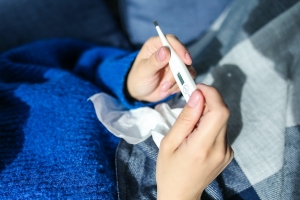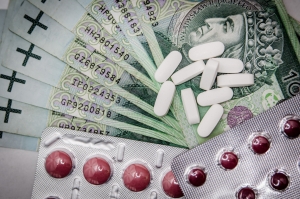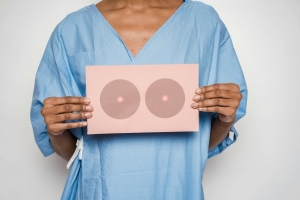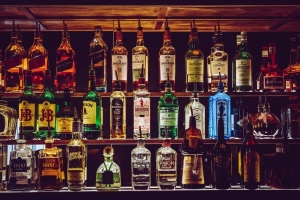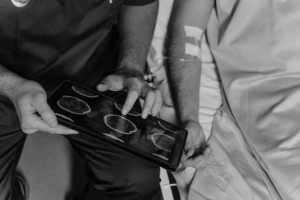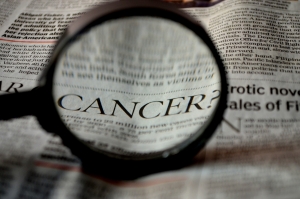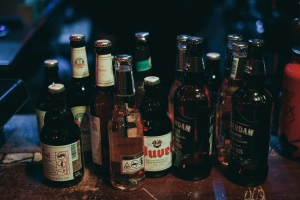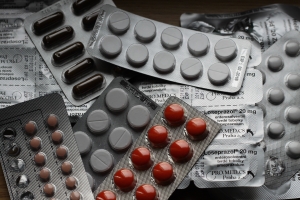Can a hangover get you a fever?
Janeiro 04, 2023Very common question: can a hangover cause a fever? Read our text and find out.
Can Supplements Help Cure a Hangover?
Janeiro 04, 2023Studies show that the use of certain supplements and natural extracts can help alleviate some hangover symptoms.
Harmful alcohol consumption and breast cancer
Junho 10, 2024Harmful alcohol consumption and breast cancer
Understand how harmful alcohol consumption can be related to the disease.
Cancer is one of the leading death causes worldwide, responsible for approximately 10 million deaths in 2020, or almost one in every six deaths. Breast cancer is currently the most prevalent tumor worldwide. Factors that increase the risk of breast cancer include old age, obesity, harmful alcohol consumption, family history of breast cancer, radiation exposure, gynecological history (age of menarche, first pregnancy, etc.), smoking, and postmenopausal hormone therapy (1).
Excess alcohol has carcinogenic potential, that is, it can cause various types of cancer. There is epidemiological evidence that alcohol consumption increases the risk of tumors in many organs, for example, in the oral cavity, larynx, esophagus, liver, pancreas and colorectum (2). According to the Global Cancer Observatory of the International Agency for Research on Cancer (IARC), an institution part of the WHO, 4.1% of new cases in 2020 were attributable to alcohol consumption.
Effects of alcohol on breast cancer (3)
Alcohol consumption is well established as a risk factor for breast cancer. The involvement of alcohol consumption in breast cancer is a complex process that acts through several mechanisms. And although alcoholic beverages contain a variety of compounds that contribute to carcinogenesis (the process of cancer formation), alcohol itself appears to be the most important component in this case.
However, the underlying mechanisms for alcohol to be carcinogenic still need to be clarified. Potential mechanisms include: oxidative stress, cell proliferation, effects on hormones (particularly steroid hormones), and effects on carbon metabolism.
When ingested, alcohol is metabolized into acetaldehyde, classified as carcinogenic by IARC. Although the production of acetaldehyde from alcohol occurs mainly in the liver, it also occurs in breast tissues and one of the adverse effects of acetaldehyde include modifications to DNA. Hormonal effects due to alcohol consumption may also contribute to breast cancer. Consumption of alcoholic beverages increases hormone levels. One study reported that consumption of 30g of ethanol (~2.5 drinks) per day for three menstrual cycles was associated with a 28% increase in plasma estradiol and a 21% increase in plasma estrone among women aged 21 to 40 years (4). Elevated intracellular estrogen levels resulting from alcohol intake may promote cancer-related cell proliferation in breast tissue.
Different patterns of alcohol consumption may have different effects on the development of breast cancer, even when the total amount of alcohol intake is constant (5). According to IARC, the risk of developing breast cancer increases by 7 to 10% for every 10g (∼1 drink) of alcohol consumed daily by adult women. This association is observed in both premenopausal and postmenopausal women. Compared to other organs, the breast appears to be more susceptible to the carcinogenic effects of alcohol. This raises a clinical and public health concern, because almost half of women of childbearing age drink alcohol and 15% of drinkers at this age drink four or more drinks at the same time (4).
In Brazil, for example, a study carried out by FIOCRUZ (6) with more than 1,500 women under 50 years of age showed that those who consumed alcohol regularly for 10 years or more had a three times greater risk of developing breast cancer compared to teetotalers or occasional drinkers.
Healthy habits are essential for preventing breast cancer and other diseases, so try to practice physical activity, maintain adequate body weight, adopt a balanced diet and, if you decide to drink, consume in moderation.
References:
- OMS (2023). Brest cancer. Disponível em: https://www.who.int/news-room/fact-sheets/detail/breast-cancer.
- Connor, Jennie. "Alcohol consumption as a cause of cancer." Addiction 112.2 (2017): 222-228.
- Freudenheim JL. Alcohol's Effects on Breast Cancer in Women. Alcohol Res. 2020 Jun 18;40(2):11.
- Liu, Ying, Nhi Nguyen, and Graham A. Colditz. "Links between alcohol consumption and breast cancer: a look at the evidence." Women’s health 11.1 (2015): 65-77..
- Starek-Świechowicz, B., Budziszewska, B., & Starek, A. (2023). Alcohol and breast cancer. Pharmacological reports : PR, 75(1), 69–84. https://doi.org/10.1007/s43440-022-00426-4
- Vieira R, Tobar JSS, Dardes R, Claudio L, Thuler S. Alcohol Consumption as a Risk Factor for Breast Cancer Development: A Case-Control Study in Brazil. Asian Pac J Cancer Prev. 2018 Mar 27;19(3):703-707.
Alcohol consumption and the risk of prostate cancer
Dezembro 22, 2023Blue November, a men's health awareness and prevention campaign. Find out how prostate cancer can be influenced by alcohol consumption.
Alcohol and Cancer: Should Warning Labels Be Required on Alcoholic Beverages?
The World Health Organization (WHO) has released a document supporting the inclusion of cancer risk warnings on alcoholic beverage labels.
In early February 2025, the World Health Organization (WHO) issued a report endorsing the addition of cancer risk warnings on alcoholic beverage packaging¹ ².
According to the report, there is a concerning lack of public awareness in Europe about the link between alcohol and cancer. Alcohol is responsible for around 800,000 deaths each year in the WHO European Region, yet only a small portion of the population is aware of the risks. The WHO found that only 15% of people were aware of the link between alcohol and breast cancer, and just 39% knew of its connection to colorectal cancer. In response, the organization recommended implementing clear and prominent health warnings on alcoholic beverage labels—similar to those found on tobacco products—to help consumers make more informed decisions about their health.
Currently, only three of the 27 European Union (EU) member states have adopted warning labels on alcoholic drinks. Ireland is the only country that has passed specific legislation requiring labels to include health warnings about alcohol-related risks, including cancer. This measure will take effect in May 2026, mandating that packaging inform consumers about the dangers of alcohol use, such as liver disease and pregnancy-related risks. Other EU countries—such as France, Lithuania, and Germany—have some form of warning on alcohol labels, though not necessarily regarding cancer.
The WHO report suggests that labels should contain direct messages and possibly images to maximize impact and raise awareness of the risks associated with alcohol consumption.
Key Findings and Recommendations:
- Prominent health warnings: The WHO recommends clear and visible warning labels about cancer risks, potentially including text or pictograms to better inform consumers.
- Cancer-specific warnings: Studies show that labels mentioning cancer risks increase awareness and help reduce alcohol consumption.
- Limitations of QR codes: Only 0.26% of consumers scan QR codes for health information, reinforcing the need for visible, on-package warnings.
Alcohol and Cancer
In January of this year, U.S. Surgeon General Dr. Vivek Murthy issued a warning regarding alcohol consumption and its link to cancer³. The advisory summarized scientific evidence on the connection between alcohol and cancer, including the biological mechanisms involved. It concluded that alcohol consumption is one of the leading preventable causes of cancer in the U.S. and globally, accounting for approximately 100,000 cases annually in the U.S. and 750,000 worldwide.
The International Agency for Research on Cancer (IARC) has long acknowledged strong evidence of this link. Currently, the IARC classifies alcohol as a carcinogen that contributes to cancer in multiple parts of the body, including the oral cavity, oropharynx, hypopharynx, esophagus (squamous cell carcinoma), colon, rectum, liver, intrahepatic bile duct, larynx, and breast⁴.
References:
- Alcohol labels should warn of cancer risk, says new WHO/Europe report [Internet]. Who.int. 2021. Available from: https://www.who.int/europe/news-room/14-02-2025-alcohol-labels-should-warn-of-cancer-risk--says-new-who-europe-report
- Ferreira-Borges C, Daša Kokole, Galea G, Neufeld M, Rehm J. Labels warning about alcohol-attributable cancer risks should be mandated urgently. The Lancet Public Health [Internet]. 2025;0(0). Available from: https://www.thelancet.com/journals/lanpub/article/PIIS2468-2667(25)00040-4/fulltext
- Alcohol and Cancer Risk [Internet]. HHS.gov. 2024. Available from: https://www.hhs.gov/surgeongeneral/reports-and-publications/alcohol-cancer/index.html
- IARC Handbooks of Cancer Prevention Volume 20A: Reduction or Cessation of Alcohol Consumption [Internet]. www.iarc.who.int. Available from: https://www.iarc.who.int/news-events/iarc-handbooks-of-cancer-prevention-volume-20a-reduction-or-cessation-of-alcohol-consumption/
Effects of Reducing or Ceasing Alcohol Consumption on Cancer Risk
In 2020, it was estimated that 741,300 new cancer cases worldwide were caused by alcohol consumption. This represents 4.1% of all new cancer cases, with 6.1% among men and 2.0% among women (1).
An independent group of international experts convened by the International Agency for Research on Cancer (IARC) reviewed the existing literature to assess the effectiveness of reducing or stopping alcohol consumption in decreasing the risk of alcohol-related cancers, such as cancers of the oral cavity, pharynx, larynx, esophagus, colorectal area, liver, and female breast. Additionally, the group identified and evaluated the mechanisms of alcohol-induced carcinogenesis that may be reversed with cessation of consumption (2).
The IARC classifies alcoholic beverages, ethanol in these beverages, and acetaldehyde associated with alcohol consumption as carcinogens for humans. In addition to ethanol and acetaldehyde, alcoholic beverages may contain various toxins derived from raw materials used or that may arise during the production process.
There are several mechanisms linking alcohol to cancer, one of the most well-understood scientifically being genotoxicity, where acetaldehyde causes damage to our DNA, such as breaks and structural changes. These alterations can lead to errors in DNA replication, resulting in mutations. Over time, these mutations can accumulate and lead to cancer development, especially in parts of the body that come into direct contact with alcohol, such as the mouth, throat, and esophagus (2).
An important measure used is the Population Attributable Fraction (PAF), which helps understand how many cancer cases can be attributed to alcohol consumption in a population. To calculate PAF, researchers use data on: how much people drink; the cancer risk associated with alcohol; how many cancer cases exist. However, there are limitations, such as incomplete data, underreporting of alcohol consumption, other factors affecting the data (like smoking), and population differences. Despite these limitations, PAF is useful for understanding and preventing alcohol-related cancers.
CISA, in its annual report “Alcohol and Brazilian Health,” uses these fractions to calculate the burden of alcoholic beverages on the Brazilian population. To learn more, download the report for free on our website.
According to the study conducted by the IARC, reducing or ceasing alcohol consumption is associated with a lower risk of oral and esophageal cancers, with sufficient evidence to support this conclusion. There is limited evidence suggesting a reduction in the risk of laryngeal, colorectal, and breast cancers with the cessation of alcohol consumption. However, there is inadequate evidence to indicate that reducing or ceasing alcohol consumption lowers the risk of pharyngeal and liver cancers. Overall, researchers conclude that stopping alcohol consumption may be beneficial for reducing the risks of certain types of cancer, but the strength of the evidence varies among different cancer types.
References:
- Rumgay, H., Shield, K., Charvat, H., Ferrari, P., Sornpaisarn, B., Obot, I., Islami, F., Lemmens, V. E. P. P., Rehm, J., & Soerjomataram, I. (2021). Global burden of cancer in 2020 attributable to alcohol consumption: a population-based study. The Lancet. Oncology, 22(8), 1071–1080. https://doi.org/10.1016/S1470-2045(21)00279-5
- International Agency For Research On Cancer. IARC Handbooks of Cancer Prevention: volume 20A - Reduction or cessation of alcoholic beverage consumption. Lyon: IARC, 2024
Harmful consumption of alcohol and breast cancer
Outubro 31, 2022Pink October is a month dedicated to prevention and awareness of breast cancer. Understand how harmful alcohol consumption can be related to the disease.
Global Study Links Alcohol to Increased Risk of Pancreatic Cancer
One of the largest studies ever conducted on the subject, involving over 2.4 million people worldwide, confirms that alcohol consumption increases the risk of developing pancreatic cancer. The research, which followed participants for more than 15 years, showed that even moderate amounts of alcohol can raise the chances of the disease, regardless of whether the person smokes or not.
The Study
An international study¹ published in the scientific journal PLOS Medicine analyzed data from over 2.4 million people across 30 countries to better understand the relationship between alcohol consumption and pancreatic cancer. Over the 15-year follow-up period, researchers recorded more than 10,000 cases of the disease. While the link between alcohol and pancreatitis — an important risk factor for pancreatic cancer — was already well established, direct evidence connecting alcohol and pancreatic cancer remained limited or inconclusive until now.
What the Study Found
The results showed that for each additional daily alcoholic drink (equivalent to about 10g of pure alcohol), the risk of pancreatic cancer increases by 3%. To put that in perspective, 10g of alcohol is roughly equivalent to:
- 1 small can of beer (269 ml)
- 1 small glass of wine (100 ml)
- 1 shot of spirits (30 ml of whisky, vodka, etc.)
For women: Consuming 1–2 drinks per day increases the risk of pancreatic cancer by 12% compared to those who drink very little.
For men: The risk rises by 15% for those who consume 2–4 drinks daily and jumps to 36% for those drinking more than 4 drinks per day.
Alcohol and Smoking: A Dangerous Combination—but Not the Only One
A key finding of the study is that alcohol increases the risk of pancreatic cancer even among people who have never smoked. This means it's not just the alcohol + tobacco combination that's dangerous—alcohol alone already poses a risk.
Researchers observed a similar increase in risk among:
- People who never smoked
- Former smokers
- Current smokers
Not All Alcoholic Beverages Are the Same
Another interesting finding was that different types of alcoholic drinks may have varying effects:
- Beer and spirits (such as whisky, vodka, cachaça): Were associated with an increased risk of pancreatic cancer.
- Wine: Showed no significant association, possibly due to beneficial compounds like polyphenols present in the drink.
Regional Differences
The study also revealed notable geographic differences. The increased risk was mainly observed in:
- Europe and Australia
- North America (including Brazil)
In contrast, no such association was found in Asian countries—likely because many people in those regions have a genetic variation that makes them less tolerant to alcohol, leading to lower consumption levels.
What This Means in Practice
Pancreatic cancer is one of the most aggressive forms of cancer, with low survival rates. Therefore, understanding its risk factors is essential for prevention.
Key takeaways:
- Even moderate alcohol consumption can increase risk
- The risk rises with higher amounts consumed
- Women appear more sensitive, with increased risk starting at 1–2 drinks per day
- For men, the risk becomes more evident from 2–3 drinks per day
Study Limitations
It’s important to note that the study had some limitations:
- It only assessed alcohol consumption at a single point in time, not over a lifetime
- It didn’t account for specific drinking patterns, such as weekend binge drinking
- It relied on self-reported alcohol intake, which may be underestimated
Conclusion
This research reveals that alcohol consumption—even in small amounts—is a modifiable risk factor for pancreatic cancer. Being aware of these risks is important, especially if you have other predisposing factors such as smoking, obesity, type 2 diabetes, chronic pancreatitis, or a family history of the disease.
References:
- Naudin S, Wang M, Dimou N, et al. Consumo de álcool e risco de câncer de pâncreas: Uma análise de 30 estudos prospectivos da Ásia, Austrália, Europa e América do Norte. PLoS Med. 2025;22(5):e1004590.
New drug to treat alcoholism
Janeiro 04, 2023Would Spironolactone be a new treatment option for alcohol use disorders?


